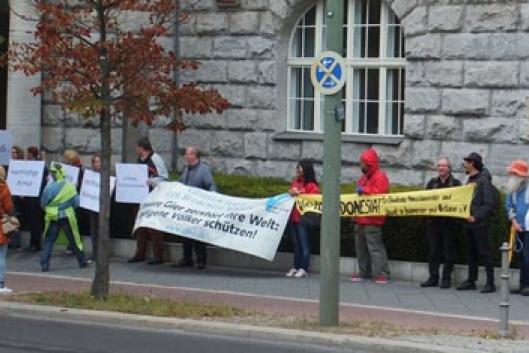Millions of hectares of industrial oil palm plantations have been expanding in many countries of Asia, Africa and Latin America with a well documented history of tropical deforestation –including enormous fires- and a sad toll of human rights violations.
However, the powerful interests behind this business continue actively promoting this crop, against a background of growing opposition at the local level.
Within this context the Roundtable on Sustainable Palm Oil (RSPO) was created. The RSPO is a stakeholder forum which provides voluntary certification for the management of oil palm plantations and processing plants of palm oil, and whose great majority of members represent industry interestslike Nestlé, Rabobank and Unilever - all linked to cases of land-grabbing in Asia, Latin America and Africa.
Indeed, the RSPO acts as a greenwashing tool, aiming at ensuring consumers that the palm oil they consume –in foodstuffs, soap, cosmetics or fuel- has been produced in a “sustainable manner” despite the hundreds of conflicts that their plantations have created with local communities wherever they are established. The RSPO wants to certify the uncertifiable, trying to conceal the inherent unsustainability of large scale monoculture oil palms. The “sustainability” label is used to cover up the serious social and environmental impacts of large-scale oil palm plantations on local communities and livelihoods.
Facing the RSPO in Honduras
On 6th-8th August, the Fourth Latin American Roundtable on Sustainable Palm Oil took place in Honduras, organized by the Ministry of Agriculture and Livestock and the Federation of Industrial Oil Palm Producers.
Environmental and social campaigners have been shocked to learn that one event sponsor is the palm oil company Dinant Corporation, owned and controlled by Miguel Facusse, the largest landowner in Honduras. Facusse, one of the three mayor oil palm growers, has been linked to the targeted killing of more than 88 members and supporters of peasant organisations since June 2009 in the Aguan Valley, one of the main palm oil producing regions in Honduras.
On the occasion of the RSPO’s Latin American Conference, WRM issued a press release denouncing that “certification schemes like the RSPO undermine the ability of communities to defend their territories and forests and fight back against the expansion of industrial plantations. They also obstruct the urgent need to develop different models of production and consumption that do not depend on the ever greater consumption of palm oil and other raw materials, as in the case of the current corporate and centralized model of production that dominates the world markets and patterns of consumption and is destroying the planet.”See: RSPO: ´greenwashing´ of industrial oil palm plantations, at http://www.wrm.org.uy/oldsite/
Also, the international organisations Rights Action, Rainforest Rescue, Biofuelwatch and Food First condemned in a press release the Latin American Conference on so-called sustainable palm oil. They are calling World Wildlife Fund (WWF) and three other big NGOs to withdraw from and denounce the conference being held in Honduras. See “Expanding palm oil empires in the name of ‘green energy’ and ‘sustainable development’”, http://www.biofuelwatch.org.
As a way to denounce the RSPO’s Latin American conference, the trade union organization Rel-UITA interviewed Gilberto Ríos and Alba Ochoa, from FIAN Honduras, who stated that the conference is a fake because its real goals have nothing to do with sustainability and responsibility and let alone with the defense of the environment, human rights and food sovereignty. They assure that RSPO’s goals are merely commercial and the conference is just a tool to expand oil palm’s trade.See “La farsadelaceite de palmasostenible. Certificaciones, negocios y lavado de imagenparaempresariospalmeros”
Facing the RSPO in Germany: Scrubbing off the greenwash
Activists from environmental and human rights organisations staged protests against the RSPO greenwashing of large scale oil palm plantations at two high-profile meetings on oil palm on 2 and 3 September in Berlin, Germany. On 2 September participants arriving for the launch of the so-called ‘Forum for Sustainable Palm Oil’ were greeted by activists equipped with brushes, buckets and green washing liquid. They were scrubbing off the layer of greenwash provided by the certification scheme to expose the unsustainability and continued destruction involved in the production of palm oil, certified or not. Activists continued their scrubbing at the European meeting of the ‘Roundtable for Sustainable Palm Oil’, RSPO, on 3 September at the Estrel Hotel in Berlin.
In the joint action, Watch Indonesia, Urgewald, Robin Wood, Rettet den Regenwald, and the Society for Threatened Peoples showed that “cheap palm oil has a high price.” Activists from Indonesia shared how this high price is paid by people who are robbed of their land and livelihood, and by forests that continue to be destroyed as the expansion of oil palm plantations advances. They called on the German government to halt import of destructive palm oil instead of launching yet another greenwashing forum. “The German government is pulling the palm oil lobby’s cart. Human rights violations are inextricably linked with palm oil in Indonesia and Malaysia, where 90% of the world’s palm oil is produced,” the groups said in a joint press release.For more information see http://urgewald.org/artikel/
